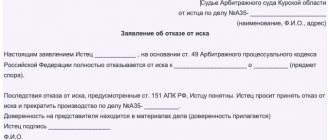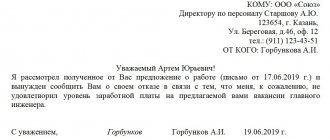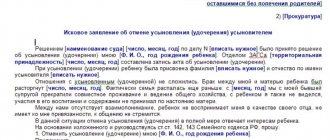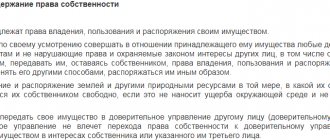Procedure for filing a claim
In order for the court to consider and resolve a legal dispute, a claim must be filed.
Filing a claim is regulated by Ch. 12 Code of Civil Procedure of the Russian Federation.
The external form of expressing a claim is a statement of claim , which is presented to the court in writing (Article 131 of the Code of Civil Procedure of the Russian Federation). An interested person may file a claim in court:
- personally;
- send by mail;
- by filling out the form posted on the official website of the court on the Internet.
Contents of the claim
The content of the application must comply with Art. 131 Code of Civil Procedure of the Russian Federation, i.e. include:
- name of the court to which the application is filed;
- the name of the plaintiff, his place of residence or, if the plaintiff is an organization, its location, as well as the name of the representative and his address, if the application is submitted by a representative;
- the name of the defendant, his place of residence or, if the defendant is an organization, its location;
- what is the violation or threat of violation of the rights, freedoms or legitimate interests of the plaintiff and his demands;
- the circumstances on which the plaintiff bases his claims and evidence supporting these circumstances;
- the price of the claim, if it is subject to assessment, as well as the calculation of the collected or disputed amounts of money;
- information about compliance with the pre-trial procedure for contacting the defendant, if this is established by federal law or provided for by the agreement of the parties;
- list of documents attached to the application.
The application may indicate telephone numbers, fax numbers, email addresses of the plaintiff, his representative, the defendant, other information relevant to the consideration and resolution of the case, as well as the plaintiff’s requests.
The content of the statement of claim for certain categories of civil cases is determined based on
- the nature of the disputed material legal relationship,
- subject composition and
- a number of other circumstances,
essential for the correct resolution of the case.
So, for example, in a statement of claim for divorce, in particular, it is indicated when and where the marriage was registered, whether there are common children, their age; whether the spouses have reached an agreement on their maintenance and upbringing; in the absence of mutual consent to dissolve the marriage - the reasons for the dissolution of the marriage; are there other requirements that can be considered simultaneously with the claim for divorce (clause 7 of the resolution of the Plenum of the RF Armed Forces of November 5, 1998 “On the application of legislation by courts when considering cases of divorce”).
In practice, it often happens that the location of the defendant is unknown; then the address of the last known place of residence is indicated (Article 119 of the Code of Civil Procedure). If the location of the defendant is unknown for claims made in defense of the interests of the Russian Federation, constituent entities of the Russian Federation, municipalities, as well as for claims for the collection of alimony, compensation for damage caused by injury, other damage to health or as a result of the death of the breadwinner, the judge is obliged to make a ruling on announcing a wanted list for the defendant (Article 120 of the Code of Civil Procedure).
The statement of claim must indicate the circumstances on which the plaintiff bases his claims (i.e. those that are included in the basis of the claim):
- law-forming;
- law-altering;
- terminating.
Evidence confirming these circumstances must also be provided. In this case, the application must inform the court of the names and surnames of witnesses and persons who have written or material evidence, their addresses, etc., and indicate a list of attached documents.
In addition, the Code of Civil Procedure requires that the application include information about compliance with the pre-trial procedure for contacting the defendant, if this is established by federal law or provided for by the agreement of the parties.
The application can provide information about telephone numbers, fax numbers, email addresses of the plaintiff, its presenter defendant, other information relevant to the consideration and resolution of the case, as well as state petitions. For example, petitions to obtain evidence, to conduct an examination, to send letters rogatory to collect evidence in another region (interrogation of a witness).
The Civil Procedure Code does not require legal qualification of the plaintiff’s request, i.e. mandatory reference to a rule of substantive law (with the exception of the prosecutor’s statement of claim).
In practice, it has also developed that an application submitted by a lawyer or legal adviser must contain a reference to the law.
The statement of claim brought by the prosecutor in defense of the interests of the Russian Federation, constituent entities of the Russian Federation, municipalities or in defense of the rights, freedoms and legitimate interests of an indefinite number of persons must indicate what exactly their interests are, what right is violated, and must also contain reference to a law or other regulatory legal act that provides ways to protect these interests.
If the prosecutor appeals to protect the legitimate interests of a citizen, the application must contain a justification for the impossibility of bringing a claim by the citizen himself or an indication of the citizen’s appeal to the prosecutor.
The statement of claim is signed by the plaintiff or his representative if he has the authority to sign the statement and present it to the court.
According to Art. 133 of the Code of Civil Procedure establishes that the judge, within 5 days from the date of receipt of the statement of claim in court, is obliged to consider the issue of its acceptance for court proceedings. Thus, the judge decides on the acceptance of the application alone.
Filing a statement of claim with the court and initiating proceedings in the case entails certain legal consequences. The most important of them is the emergence of civil proceedings in a specific case. It is from the moment the statement of claim is accepted that the movement of the case begins. In addition, filing and accepting a statement of claim entails the following consequences:
1) procedural legal (a procedural legal relationship arises):
- the court has an obligation to consider the dispute between the parties and make a decision on the case;
- the person who filed the claim becomes the plaintiff and acquires all procedural rights and obligations provided by law;
- the person who is indicated in the statement of claim as a violator of the right becomes a defendant and also acquires all the rights of a party.
2) substantive:
- the limitation period is interrupted (Article 204 of the Civil Code of the Russian Federation).
When filing a claim, all prerequisites for the right to file a claim must be met:
- the presence of legal capacity of the applicant - plaintiff;
- jurisdiction and jurisdiction of the case to the court;
- mandatory compliance with the pre-trial procedure for resolving a dispute, if this is provided for by federal laws or an agreement;
- the absence of a court decision that has entered into legal force on the same dispute, between the same parties, on the same subject and on the same grounds;
- absence of a court ruling on termination of proceedings in connection with the acceptance of the plaintiff’s refusal of the claim or approval of a settlement agreement between the parties;
- absence of an arbitration court decision on the same case, except for cases where the court refused to issue a writ of execution to enforce the arbitration court decision.
Compliance with the form of the statement of claim should also include the requirements of Art. 132 of the Code of Civil Procedure, which provides a list of documents attached to the statement of claim, which include:
- copies of the statement of claim in accordance with the number of defendants and third parties;
- a document confirming payment of the state duty;
- power of attorney or other document certifying the authority of the plaintiff’s representative;
- documents confirming the circumstances on which the plaintiff bases his claims, copies of these documents for defendants and third parties, if they do not have copies;
- evidence confirming the implementation of the mandatory pre-trial dispute resolution procedure, if such a procedure is provided for by federal law or agreement;
- calculation of the recovered or disputed amount of money, signed by the plaintiff, his representative, with copies in accordance with the number of defendants and third parties.
Regulatory regulation
It is impossible to indicate specific articles of the code devoted to filing a claim in court and limit oneself to them. The law has a whole section on claim proceedings. Its provisions partly apply to special proceedings and other stages of proceedings (appeal, cassation, supervision).
The clarifications of the RF Armed Forces on the application of rules of procedural law of a general nature, and those reflected in decisions on specific cases, also play a role in regulation.
Consequences of failure to comply with the procedure for filing a claim
When accepting an application, the judge is obliged to check compliance with the requirements of procedural legislation, both regarding the prerequisites for the right to sue, and regarding the form and content of the application, in the event of non-compliance with which:
- the judge refuses to accept the statement of claim or the statement is returned - if at least one of the prerequisites for the right to claim is missing (Articles 134, 135 of the Code of Civil Procedure);
- the statement of claim is left without movement - if it does not meet the requirements for its form and content (Article 136 of the Code of Civil Procedure of the Russian Federation).
Failure to provide sufficient evidence does not constitute a violation of the form and content of the application and for this reason it cannot be left without progress. In this case, the application is accepted, and the court offers to present additional evidence.
The judge issues a ruling on the acceptance of the application for court proceedings, on the basis of which a civil case is initiated in the court of first instance (Article 133 of the Code of Civil Procedure of the Russian Federation).
Representation
A legal entity has the right to issue a power of attorney to any person; it is certified by his seal and the signature of an authorized official.
Citizens represent the interests of others on the basis of a power of attorney, certified in accordance with the provisions of the law. The right of parents and guardians to represent the interests of children and wards is assumed. Fully or partially incapacitated persons are also represented by guardians and trustees. The basis is a birth certificate and a resolution of the guardianship authority. The procedure for filing a claim in civil proceedings obliges the applicant to provide the court with relevant evidence. Their absence will lead to the return of the claim or to the beginning of its abandonment.
State duty amount
In property claims, one of the main points is the cost of the claim. The amount at which the plaintiff values his claim. It is determined by the transaction price, the amount that the plaintiff asks to recover, and the price of the disputed property.
The articles of the Tax Code on state duty formulate the rules for calculating the amount of state duty. It is directly linked to the claim price.
An upward change in the price of the claim obliges you to pay the remaining amount of state duty.
The law allows the judge, upon application by the plaintiff, to exempt him from the fee or defer its payment during the trial. Some citizens are given a benefit in paying state taxes.
Participation of the prosecutor's office
The procedure for bringing a claim in civil proceedings by prosecutors is based on the provisions of the Civil Procedure Code. They have the right to act in this way on the basis of a statement from a citizen whose social rights are affected by the actions and inactions of other persons. The claim is also being filed based on the results of an investigation conducted by the prosecutor's office.
The prosecutor's office has the right to go to court to protect the rights of an unlimited number of citizens. While a full-fledged procedure for filing class actions is not prescribed in the law, it remains to act through the prosecutor’s office or other authorities.
If the plaintiff made errors in the registration
Now about the procedure for filing a claim and the consequences of non-compliance. The law identifies two consequences for violations of the application form:
- return of claim;
- leaving the application without progress.
In the first case, according to the provisions of the Civil Procedure Code, the documents are immediately returned to the plaintiff. Having corrected the mistakes made, he has the right to file the same claim with the same requirements.
If left without movement, the judge sends the plaintiff a letter in which he sets out what shortcomings there are and within what time they need to be corrected. On average, two weeks are given.
Return is possible in the absence of a power of attorney in the name of the person who signed the claim. The claim is left without progress due to an incomplete set of documents and the absence of a receipt for payment of state duty and other violations of the law.
Jurisdiction provisions
The procedure for filing a claim in civil proceedings requires compliance with the rules of jurisdiction. What is their essence?
In Russia there is a system of dividing cases into two courts:
- courts of general jurisdiction;
- courts of the arbitration system.
The first courts consider civil, family, labor, and land disputes with the participation of citizens, authorities and organizations.
If citizens with the status of an entrepreneur take part in the dispute, the dispute is considered by an arbitration court (if it is not family, not labor, and not related to purely economic activity).
Courts decide cases on the recognition of decisions of foreign courts in civil cases, on the review of decisions of an arbitration court. Cases of special proceedings are allocated to a separate category. All other disputes are resolved in the arbitration court system. If the claims of the claim are subject to simultaneous consideration in arbitration and in the general court, priority is given to the general court.










